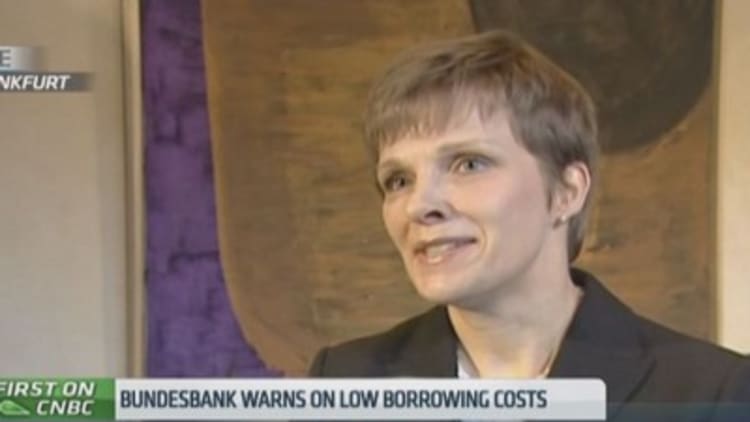
Germany's Bundesbank has underlined the financial risks to investors in certain asset markets at a time when the European Central Bank (ECB) is expected to step up its aggressive monetary policy.
Claudia Buch, the deputy president of the Bundesbank, told CNBC that there were "misaligned incentives" in the financial system and detailed her current concerns from ultra-low borrowing costs.
"It's very difficult to identify bubbles, this is something we have learned from the crisis. If anything, looking at corporate bonds, syndicated loans, that's an area where we are seeing tendencies of overvaluation," she said.
Read MoreEuro area 'major risk to world growth': OECD
"We see less so in equity markets but of course this statement is only as good as the underlying model we're using."
The ECB is buying fixed income assets of this kind in an attempt to combat low inflation in the euro zone which has helped to sap growth in some of the largest economies in the region. Buch claimed that her words were not a statement on this monetary policy. Nonetheless, she added that investors needed to be aware of the areas of overvaluation which might have an impact on financial stability.
Read MoreEuro zone torpor hits German, French, Italian firms
"My concern more is that investors go into these market segments," she said. "Do they have sufficient capital buffers in case risks are materializing, in case they can actually buffer those risks on their own?"
Stock markets have been edging higher for the last few sessions with market chatter highlighting that some are pricing in the possibility of an announcement of more credit easing by the ECB next week. Credit Suisse economists believe that "an explicit announcement" on a large-scale asset purchase program - including sovereign debt - is on the cards.
Germany is the largest euro zone country and would likely be the recipient of the largest amount of ECB cash under a Federal Reserve-style quantitative easing (QE) program. Germany is traditionally the most concerned when it comes to more aggressive monetary policy.
There are fears on the part of policymakers in the country that it could stoke inflation and stop struggling euro zone governments from concentrating on implementing fiscal reforms. The President of Germany's Bundesbank, Jens Weidmann, also warned Monday that the ECB could encounter "legal limits" if it pursued QE, according to Reuters, furthering questioning whether the ECB had a mandate to allow it to implement such measures.
Read MoreGerman housing up to 25% overvalued, Bundesbank warns
Buch also warned on the risks surrounding the country's real estate market, with a divergence appearing between properties in rural and urban areas. The central bank has previously warned that German housing could be up to 25 percent overvalued.
Germany has not had significant price increases for a long period of time, Buch said, and demographics in the country are accentuating these price rises, she added. Surveying the nation's banks and their exposure to the sector she explained that the evidence was "somewhat mixed".
"We do not see that credit growth is increasing with the prices of real estate," she said. "We do see however that some banks are structurally exposed to changes in prices in the real estate sector and that's why we have also induced the banks to increase their risk buffers and be aware of the situation that at some point in time the market situation may change."
She said that the bank was "very concerned" about the activity in Germany's real estate market and the historical evidence of what it can do to financial stability.



